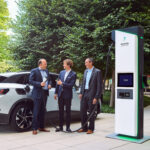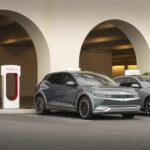An electric vehicle (or EV) can be responsible for much of a household’s electricity consumption. According to the federal Residential Energy Consumption Survey, U.S. households’ average annual EV charging consumed over 2,300 kWh (or 2,363 kWh, to be exact) in 2020.
That’s a significant number from a household perspective, which, depending on vehicle efficiency, is probably enough to cover several thousand miles annually– up to 10,000 miles, according to the lowest EPA energy consumption numbers for 2023-2024 model year vehicles. Some might be way above that number, especially if they drive a lot or have more than one EV. We can also assume that the actual average mileage might be higher if any EVs were charged at work or publicly available stations.
For reference, the data indicates that heating and cooling are still considered the most significant gluttons of electricity consumption. In 2020, the average yearly energy consumption for air conditioning amounted to 2,775 kWh. Space heating was right behind at 2,717 kWh per year, followed by water heating at 2,706 kWh. The numbers are drawn from U.S. households that actively used electricity for cooling or heating purposes.
Interestingly, the following chart indicates that the average yearly energy consumption for EV charging is comparable to four refrigerators (a single one uses 839 kWh per year, on average).

Average Annual Household Electricity Consumption for Selected Appliances, 2020. Source: U.S. Department of Energy’s Vehicle Technologies Office
The data once again proves that heating and cooling are major energy drains – both in a household and in an electric vehicle, which suffers some range loss in winter due to heating.
An electric vehicle might easily become the largest consumer of electricity in a household that does not have air conditioning or electric heating. Still, assuming that a home has at least air conditioning, the addition of an EV should not be radical – though it will be a substantial increase.
It’s worth considering recharging electric vehicles during off-peak hours to lower energy bills and avoid running all loads simultaneously. Another thing to consider is the addition of a solar array, which would reduce the household’s overall energy consumption.

F-150 Lightning with available Ford Intelligent Backup Power can provide power and security during an electrical outage – the first electric truck in the U.S. to offer this capability. In the future, new features will offer additional ways to manage energy use and potentially save on energy costs.
Data source: U.S. Energy Information Administration, 2020 Residential Energy Consumption Survey (via U.S. Department of Energy’s Vehicle Technologies Office)








0 Comments